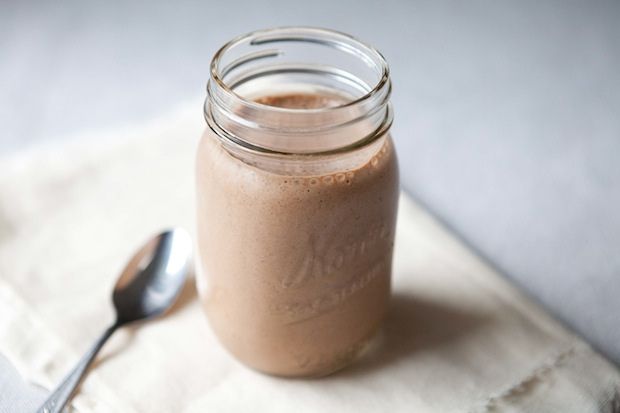Coffee, Banana, Yogurt Smoothie

Ingredients:
2 scoops unflavored or vanilla flavored protein powder
4 oz greek plain yogurt
1/2 Banana (cut and freeze banana chunks, add chunks when needed)
2 tbsp. decaf instant coffee
4-8 oz water
Directions:
Add all ingredients to blender and blend until very smooth (no chunks).
Add water to thin to milk-consistency.
NUTRITIONAL INFORMATION:
Calories: 340
Fat: 3 g
Cholesterol: 15 mg
Sodium: 180 mg
Carbohydrates: 25 mg
Protein: 54 g
A nutritionist and I were just discussing this. We've actually never been able to confirm this with a study. I've had one nutritionist tell me this, and another tell me the body absorbs all the protein (just slower). Thing is, according to the rules of biochemistry, all eaten protein eaten is broken down into amino acids. The question is: what happens to these amino acids if we can't utilize them all? (My degree was originally in biochemistry.) Severe excess are turned into glucose via gluconeogenesis, but you'd like have to eat way more than a bariatric patient can consume. And, we do know how quickly amino acids are absorbed: no more than 10g/hour, typically. However, that isn't necessarily equivalent to protein. One study I stumbled across suggested that consuming 35g of protein in one meal resulted in higher rates of protein synthesis than 20g or 10g (http://ajcn.nutrition.org/content/90/1/106.long). So, the body absolutely uses more than 30g...at least in this one study.
The 30g/time actually comes from the fitness/bodybuilder community. Your muscles won't use more than 30g of protein at once (so people say), but we use protein for many more things than muscle construction.
There are more issues with protein overconsumption: dehydration, for example. We need water to process the protein (it's part of why we all have to drink water post-op). If excess protein wasn't processed, that wouldn't be a concern.
Likely the excess is converted into glucose (like, if you're eating 100+ grams a day or more) - which is good, because it means we can consume fewer carbs during weight loss directly.
I follow a ketogenic diet post-op. I also have a diagnosis of binge eating disorder. Feel free to ask me about either!
It is not that we have so little time but that we lose so much...the life we receive is not short but we make it so; we are not ill provided but use what we have wastefully. -- Seneca, On the Shortness of Life
Yea, I have a hard time subscribing to the 30 gram theory myself. I have researched and found that this comes from body builder's rule of thumb; which, isn't a bad thing, but a 90 pound ballerina vs. a 250 pound body builder - well, it just doesn't add up to me. Obviously, there would be a vast difference in what each body would need and be able to use up. I am a stickler for scientific fact (due to my profession). I'm a lab rat, so I do testing for all these analytes that tells us we are where we need to be; nutrition-wise. Thank you for your input, very interesting.







